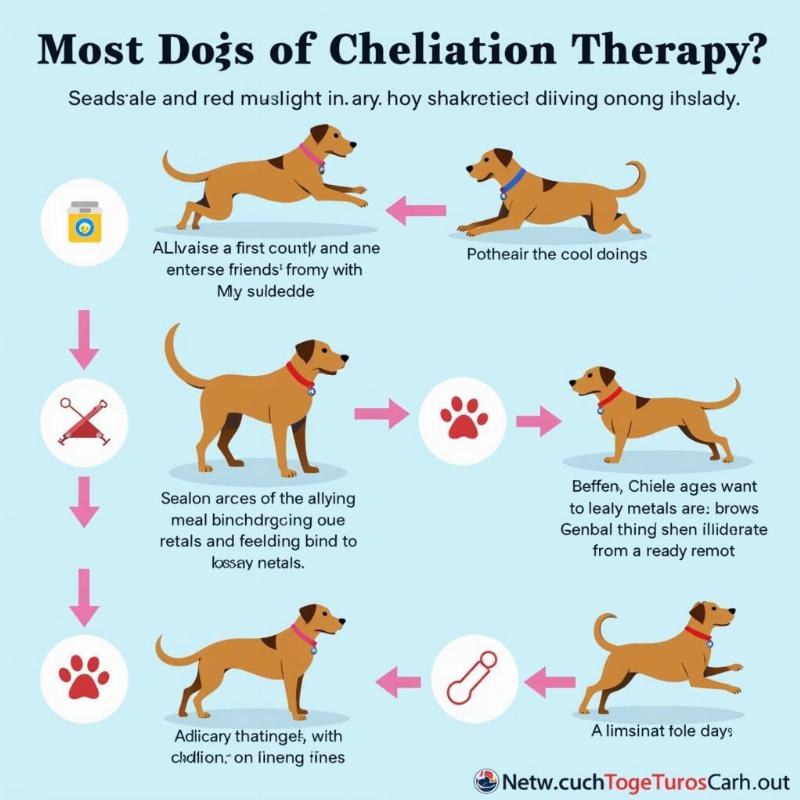Heavy metal toxicity in dogs is a serious concern for pet owners across the US. Exposure to heavy metals like lead, arsenic, mercury, and cadmium can have devastating effects on a dog’s health, leading to a range of symptoms and long-term complications. Understanding the sources of exposure, recognizing the signs of toxicity, and knowing how to effectively detoxify your dog are crucial for ensuring their well-being.
Understanding Heavy Metal Toxicity in Dogs
Heavy metals can enter a dog’s system through various channels, including contaminated food and water, exposure to certain types of paint or industrial waste, and even some medications. Once inside the body, these metals accumulate in organs and tissues, disrupting normal physiological functions. The severity of the toxicity depends on the type of metal, the level of exposure, and the dog’s overall health.
Symptoms of heavy metal poisoning can vary widely, making diagnosis challenging. Some common signs include gastrointestinal issues like vomiting and diarrhea, neurological problems such as seizures and tremors, lethargy, and changes in behavior. If you suspect your dog has been exposed to heavy metals, it’s vital to consult a veterinarian immediately. Early diagnosis and treatment are key to minimizing long-term damage.
Detoxification Methods for Dogs
Several methods are employed to remove heavy metals from a dog’s system. Chelation therapy, a common approach, involves administering medications that bind to the heavy metals, allowing them to be excreted through the urine. Other supportive therapies, such as fluid therapy and nutritional support, are often used in conjunction with chelation to aid in the detoxification process and manage symptoms.
 Chelation Therapy for Dogs
Chelation Therapy for Dogs
Natural detoxification methods, such as incorporating certain foods and supplements into your dog’s diet, can also be beneficial. Foods rich in antioxidants, like blueberries and cranberries, can help protect against the damaging effects of free radicals produced by heavy metal exposure. Similarly, supplements like chlorella and cilantro are believed to aid in heavy metal removal. However, it’s important to consult with your veterinarian before using any natural remedies, as they may interact with other medications or underlying health conditions.
Preventing Heavy Metal Exposure
Prevention is always the best approach. Be mindful of your dog’s environment and limit their exposure to potential sources of heavy metals. Ensure their food and water are clean and uncontaminated, and avoid using pesticides or herbicides in areas where your dog plays. Regularly inspect your dog’s toys for signs of wear and tear, and replace them if necessary. If you live in an older home, be cautious of lead-based paint, and consider having your home tested for heavy metal contamination.
Conclusion
Heavy metal detox for dogs requires a multifaceted approach involving veterinary care, supportive therapies, and preventative measures. By understanding the risks, recognizing the symptoms, and taking proactive steps, you can protect your furry friend from the harmful effects of heavy metal exposure and ensure a long and healthy life.
FAQs
-
What are the most common heavy metals that affect dogs? Lead, arsenic, mercury, and cadmium are the most frequently encountered heavy metals that can cause toxicity in dogs.
-
How can I tell if my dog has heavy metal poisoning? Symptoms vary but can include vomiting, diarrhea, seizures, tremors, lethargy, and behavioral changes. Consult your vet immediately if you suspect exposure.
-
What is chelation therapy? Chelation therapy involves administering medications that bind to heavy metals, facilitating their removal from the body through urine.
-
Are there natural ways to detoxify my dog from heavy metals? Certain foods and supplements may be beneficial, but always consult your vet before using them.
-
How can I prevent heavy metal exposure in my dog? Ensure clean food and water, avoid contaminated areas, check toys regularly, and be mindful of lead paint in older homes.
-
Is heavy metal poisoning reversible in dogs? The prognosis depends on the type of metal, the level of exposure, and the dog’s overall health. Early treatment is crucial for the best outcome.
-
What should I do if I think my dog has been exposed to heavy metals? Contact your veterinarian immediately for diagnosis and treatment.
Beautdogs.us: Your Trusted Source for Dog Care
Beautdogs.us is a leading dog lifestyle website in the US, offering expert advice on dog breeds, care, and products. We provide comprehensive and engaging content for both new and experienced dog owners, covering everything from breed information and training tips to health advice and product reviews. Beautdogs.us aims to be your one-stop shop for all your dog-related needs. For expert advice and tailored guidance, contact our team at [email protected] or call us at +1 501-555-7529.